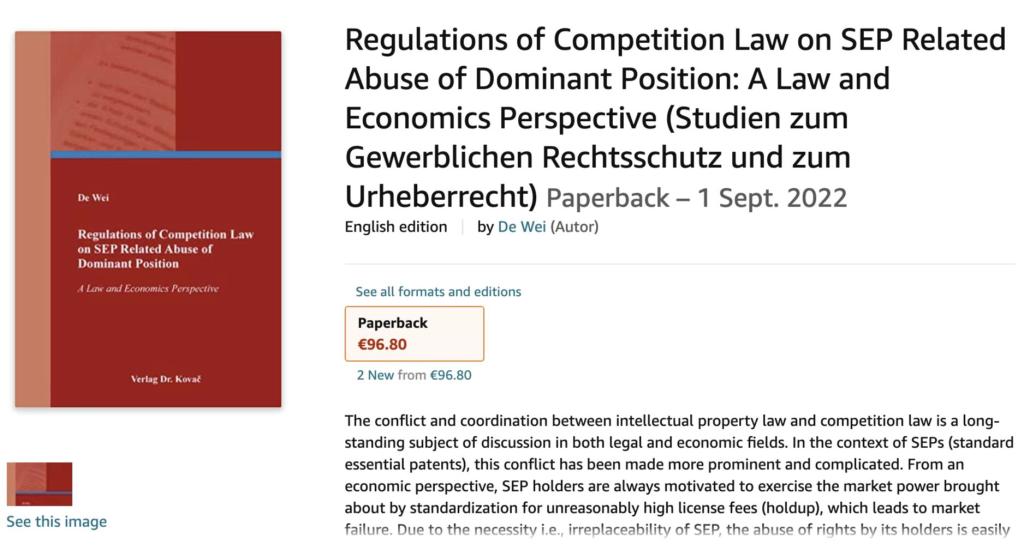

知识产权法与竞争法之间的冲突与协调是法学与经济学层面长期以来讨论的话题,法律通过不断调整,力求在鼓励创新和促进技术实施之间取得平衡。当标准与专利相结合,专利天然的“垄断性”与标准倡导“公共性”产生强烈的冲突,进而引发新的市场失灵。标准必要专利(SEP)权利人倾向于行使技术标准化为其带来的市场力量从而攫取不合理高的许可费(专利劫持行为,Patent Holdup)。
The conflict and coordination between intellectual property law and competition law have been a topic of discussion for a long time at the level of law and economics, so we need to constantly adjust the law to keep a balanced development between encouraging innovation and promoting technology implementation. If standards and patents are combined, there will be a strong conflict between the "monopoly" of patents and the "publicity” of standards, which will lead to new market regulation failures. The patentee of the standard essential patent (SEP) tends to grab unreasonably high license fees (Patent Holdup) by implementing the market power brought by technical standardization.
根据专利劫持力量的不同来源,该书将SEP劫持行为分为沉没成本型劫持和技术锁定型劫持两大类。经济学模型分析表明,两种类型的劫持行为,尤其是在信息通讯技术产业,均会对SEP权利人的市场势力产生提升作用,使权利人获得攫取垄断高价的能力,进而对社会公共利益带来损害。由于SEP所具备“必要性”(即不可替代性)的特征,滥用行为很容易与竞争法下的“滥用市场支配地位”相关联。
According to different sources of patent hijacking power, the concepts of SEP hijacking in the book are divided into two categories: sunk-cost hijacking and technology-locked hijacking. The analysis results of the economic model show that the two types of hijacking, especially in the information and communication technology industry, will enhance the market interest of the SEP obligee, enable the obligee to grab the monopoly high-price so as to further damage the social public interest. Because SEP has the characteristics of "necessity" (namely irreplaceable), it is easy to consider the abusive behavior together with the "abuse of market dominance" under the competition law.
该书通过运用交叉学科的研究方法,对标准化组织的知识产权政策进行实证分析,并对实践中体现的SEP滥用行为进行归类,将欧盟、美国和中国通过竞争法规制SEP权利滥用行为进行比较研究,进而提出完善标准化组织政策以及竞争法规制SEP权利滥用的建议。
The book makes an empirical analysis of the intellectual property policy of the standardization organization, classifies the abuse behaviors of SEP that occurred in the practice process, conducts a comparative study on the regulation of abuse behaviors of SEP through competition law in the EU, the United States and China, and further made the suggestions on improving the standardization organization policy and the regulation of abuse behaviors of SEP through competition law by using interdisciplinary research methods.
专家评价:
Expert evaluation:
Prof. Dr. Andreas Wiebe,德国哥廷根大学法学院教授
Dr. Andreas Wiebe, Professor of Faculty of Law in University of Göttingen in Germany
SEP的保护是专利法与竞争法相交叉领域中最具有争议的话题之一,同时该话题与实践联系紧密。理论和实践一直以来均致力于解决该对创新而言至关重要的问题,并制定出FRAND标准。该著作借助法经济学的分析路径,并从欧盟、美国和中国的比较法视角对该问题展开研究。随后该书对具体的实践行为进行分析并得出结论。该书以全球化的视角结合卓有成效的交叉学科研究路径,丰富了理论讨论并为实践改进提供解决方案。
The protection of SEP is one of the most controversial topics in the interdisciplinary domain of patent law and competition law, and it is closely related to practice. For a long time, people have been committed to solving the problems that SEP protection makes a significant impact on innovation at the theoretical and practical levels, and formulated FRAND standards. Starting from the analysis path of law and economics, the author conducts research on this issue from the perspective of comparative law of the EU, the United States and China. He also analyzes the specific practical behavior and draws conclusions in the following content of the book. In this book, the author combines the perspective of globalization with an effective interdisciplinary research path, enriching theoretical discussion and providing solutions for improvement in the process of the practice.
Prof. Dr. Thomas Eger,德国汉堡大学经济学院教授
Dr. Thomas Eger, Professor of School of Economics in Universität Hamburg in Germany
该著作为涉及SEP复杂问题的解决提供了有趣的跨学科和比较研究的参考。作者很好地展示了关于滥用垄断权的判例法如何系统地影响SEP权利人和实施者的威胁点(threat points),从而影响他们的相对议价能力(bargaining power)。进而论证了,竞争法可以如何被有效应用于平衡鼓励创新和创新产品的获得所体现的社会利益。
As a solution to the complex problems of SEP protection, the author provides a meaningful reference for interdisciplinary and comparative research in this book. The author reveals how the case law on abuse of monopoly power systematically affects the threat points of SEP obligees and implementers, thus affecting their bargaining power. Therefore, he demonstrates the method to use competition law to achieve a balance between encouraging innovation and the social interests embodied in innovative products.
Faculty of Humanities and Social Sciences
October 12, 2022
